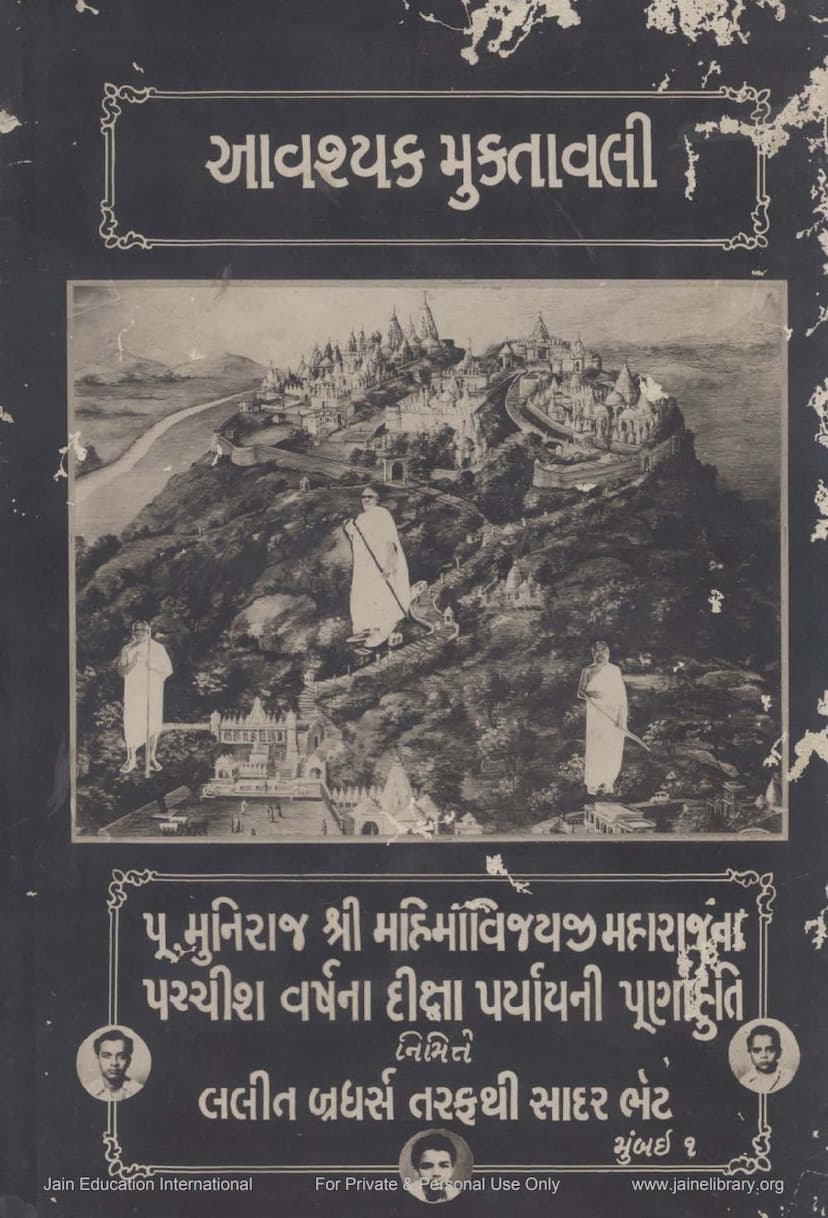Avashyak Muktavali
Added to library: September 1, 2025

Summary
Here's a comprehensive summary of the Jain text "Avashyak Muktavali" by Mahimavijay, based on the provided Gujarati text:
Overall Purpose and Content:
"Avashyak Muktavali" (આવશ્યક મુકતાવલી), compiled by Muni Shrimad Mahimavijayji, is a comprehensive collection of essential Jain scriptures, prayers, rituals, and knowledge. Its primary aim is to provide Jains, especially those dedicated to scriptural study (Swadhyaya), with a single, accessible resource for their daily spiritual practices and understanding of the faith. The book aims to make these valuable teachings readily available to a wider audience, facilitating the spread of true knowledge.
Key Features and Structure:
The text is meticulously organized into 25 sections (Khand) covering a vast range of Jain practices and knowledge, including:
- Devotional Material: Stutis (prayers), Chaitya Vandan (worship of shrines), Stotras (hymns), Sajaay (devotional songs), and other praise to the Tirthankaras.
- Ritualistic Procedures: Detailed explanations of various rituals like Snatra Puja (ritual bathing of idols), Pratikraman (confession and repentance rituals), and Samayika (meditation/equanimity practice). It clarifies how to perform these rituals and provides their brief meanings.
- Essential Scriptures: References and explanations from key Jain texts like Shatkhand (Six sections of karma theory), Tattvartha Sutra (Principles of reality), and Dasavaikalika Sutra (one of the fundamental Jain Agamas).
- Genealogy and History: Names of the 24 Tirthankaras, their parents, characteristics, lifespan, and lineage (Yaksha-Yakshini).
- Mantra and Rituals: Various mantra japa (chanting), Shanti Kalash Vidhi (peace ritual), and the significance of different fasts like Gyan Panchami, Ashtami, Ekadashi, etc.
- Moral Teachings and Advice: Sections on ethical conduct, the importance of renunciation, the nature of the soul, and guidance on distinguishing between correct and incorrect religious practices. It also includes explanations of concepts like Samyaktva (right faith) and the ten ethical disciplines (Dashashila).
- Stories and Examples: The text likely incorporates narratives and examples from Jain history and scripture to illustrate religious principles and inspire devotion.
- Practical Guidance: It offers practical instructions on how to perform various rituals and practices, emphasizing the correct way and the underlying meaning.
- Auspicious Occasions: References to the significance of events like Diwali (celebrated as the day Lord Mahavir attained Nirvana) and the importance of performing rituals on specific auspicious days.
Content Highlights Across Sections:
- Early Sections: Focus on devotional material like prayers to Prabhu (the Lord), Chaitya Vandan, various Stutis, and Sajhay (songs sung during rituals). The emphasis is on praising and remembering the divine.
- Middle Sections: Delve into the core rituals and practices of Jainism, including Pratikraman, Samayika, Paushadh, and the intricacies of performing these actions. They also cover important Jain scriptures and concepts like the Tattvartha Sutra.
- Later Sections: Expand on various other important aspects, including lists of Tirthankaras, Yaksas and Yakshinis, the importance of different mantras, and detailed explanations of rituals for various occasions. The concluding sections provide insights into the significance of virtues and the path to liberation.
Key Spiritual and Ethical Principles Emphasized:
- Devotion and Worship: The text strongly emphasizes the importance of devotion, praise, and worship of the Tirthankaras and other revered beings.
- Right Faith (Samyaktva): It highlights Samyaktva as the root of all virtues and spiritual progress, stressing the need for unwavering faith in the Tirthankaras, the Agamas (scriptures), and the spiritual guides (Gurus).
- Ahimsa (Non-violence): While not explicitly detailed in every summary point, the core Jain principles of Ahimsa are implicitly interwoven through the emphasis on pure conduct and virtuous living.
- Renunciation and Detachment: The text promotes detachment from worldly pleasures and the pursuit of spiritual knowledge and liberation.
- Ritual Purity: It stresses the importance of performing rituals with purity of mind, body, and action, following the prescribed procedures meticulously.
- Knowledge and Study (Swadhyaya): The compilation itself underscores the value of studying and understanding Jain scriptures and teachings.
- Ethical Conduct: It provides a framework for ethical living through the explanation of vows, disciplines, and the consequences of actions.
Significance of the Second Edition:
The text mentions that this is the second edition of "Avashyak Muktavali." The first edition was widely appreciated and its usefulness was proven by its popularity. The second edition significantly expands on the first, incorporating new and important subjects like:
- Devavandan (worship of deities)
- Sadhvi-Sadhvi Avashyak Kriya (rituals for monks and nuns)
- Dasavaikalika Sutra (a key Jain scripture)
- Six Karmagranth (theory of karma)
- Tattvartha (reality)
- Mantra Japa (chanting)
- Sutak Vichar (purity rules related to birth/death)
This expanded scope makes the second edition even more valuable for the Jain community (Chaturvidh Sangha) and lovers of scripture.
Contributing Factors:
The publication of this book was made possible by the generous financial support of Seth Chotalal Manilal Bakri (Lalit Brothers) from Mumbai, who sponsored the entire cost of the second edition. The book is presented as a special gift by Lalit Brothers in celebration of Muni Mahimavijayji's 25 years of spiritual initiation.
Overall Impression:
"Avashyak Muktavali" is presented as a monumental work that aims to be a comprehensive guide for Jain practice and understanding. The detailed table of contents showcases the breadth of topics covered, making it an invaluable resource for anyone seeking to deepen their knowledge and adherence to Jain principles and rituals. The compiler, Muni Mahimavijayji, is lauded for his diligent effort and the valuable collection he has brought together. The book is dedicated to the spiritual well-being and elevation of its readers.